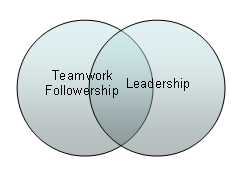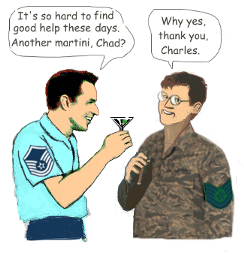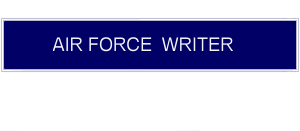Back to Main Page
TEAMWORK / FOLLOWERSHIP
Consider Team Building, Support of Team, Followership
For SSgt, TSgt, also Consider Leadership, Team Accomplishments, Recognition, Reward Others. Consider team.
What is Teamwork?
When the new AF Form 910 came out with the new categories, the one for Teamwork made me think. I wasn't sure what kind of bullet statement would satisfy this category. The form lists Team Building, Support of Team, and Followership as required topics for SrA and below and, in addition, Leadership, Team Accomplishments, Recognition, and Reward Others for SSgts and TSgts. This suggests that SrA and below should only address followership roles while SSgts and above should focus on supervisory accomplishments.
And that's all very well. It goes along with the roles and structure of the Air Force's rank system. I appreciate the fact that SrA and below aren't expected to lead and so are excused from these advanced requirements but I also think this is shortchanging the contributions of Airmen. What is leadership? What is followership? In my experience, they are one and the same, but differ only in the context viewed. For example, consider an EPR bullet such as:
"key tiger team member, provided critical process improvement ideas; team reduced processing time by 50%"
This bullet emphasizes the team member aspect of an accomplishment. What about this bullet statement:
"Led team to re-examine requirements, develop new procedures; reduced process time by 50%".
This bullet focuses on the leadership role connected to the same accomplishment. You might think that the leadership bullet sounds more important than the team member bullet based on the Air Force's fascination with leadership but, in reality, they're the same. Say, for example, that the leadership bullet was written for the NCOIC of a small CE shop whose tiger team streamlined a process. It might be the "top" accomplishment in that shop but when viewed in the context of the whole Group or Wing, it becomes just one of hundreds of processes that were changed or improved every year in dozens of workcenters across the base. Viewed in this context, the NCOIC of the CE shop is a team member of a larger organization, a minor but key player no more or less important than the Tiger Team member. What about the General who oversees the base? Are his OPR bullets any more significant than the tiger team member's or the CE Shop NCOIC? It might seem so but in the same way that each lower level is merely a member of a larger team, the General's contributions are those of a key member of a Major Command. And so on. Of course, it may be a source of some comfort to realize that you're closer to the top of the pyramid than others but our roles are the same: team members.
A large part of leadership is followership. Following the guidance of the head of the organization. Of course, leadership also requires integrity, sincerity, and concern for others which anyone, no matter their rank or station, is capable of exhibiting. Followership and leadership consist of so many of the same qualities that it's hard to tell them apart. In fact, there is a large overlapping margin that includes the best of both qualities.

In my opinion, the best kind of leadership is in that margin but leans a little toward the followership/teamwork side. This kind of selfless leadership in the margin between teamwork and leadership is more concerned with the mundane work that must be accomplished every day than with advancing one's own career. It's the qualities of the person who does his job to the best of his abilities and realizes its importance to the success of the overall Air Force mission. It's not the NCO who is more concerned with his own interests and who often disappears to participate in squadron functions in order to advance his own career.
 Leadership is not having people "work for you". In the course of my 25 year Air Force career, I can't tell you how many times I've heard supervisors refer to the airmen they worked with as "this guy that worked for me" or "those guys that worked for me". Judging by how often I heard that expression, you'd think that the Air Force is teeming with business tycoons and millionaires. Because only millionaires can afford to hire people to work for them.
Leadership is not having people "work for you". In the course of my 25 year Air Force career, I can't tell you how many times I've heard supervisors refer to the airmen they worked with as "this guy that worked for me" or "those guys that worked for me". Judging by how often I heard that expression, you'd think that the Air Force is teeming with business tycoons and millionaires. Because only millionaires can afford to hire people to work for them.
In reality, no one ever worked for those supervisors. The Air Force doesn't assign Airmen to "work for" supervisors. Supervisors are assigned the responsibility to guide and train their people but in no way do those Airmen work for their supervisor. They work for their unit, for the Air Force, for their country, and for themselves —but not for their supervisor. If the supervisor had enough brains and initiative to have other people working for him, he wouldn't be in the Air Force in the first place!
In summary, the efforts of all of us are equally important. If you think a teamwork bullet doesn't sound good, try looking at it in another context. Try viewing the Tiger Team bullet from the point of view of someone who isn't in the Air Force. I guarantee it's impressive to them.
